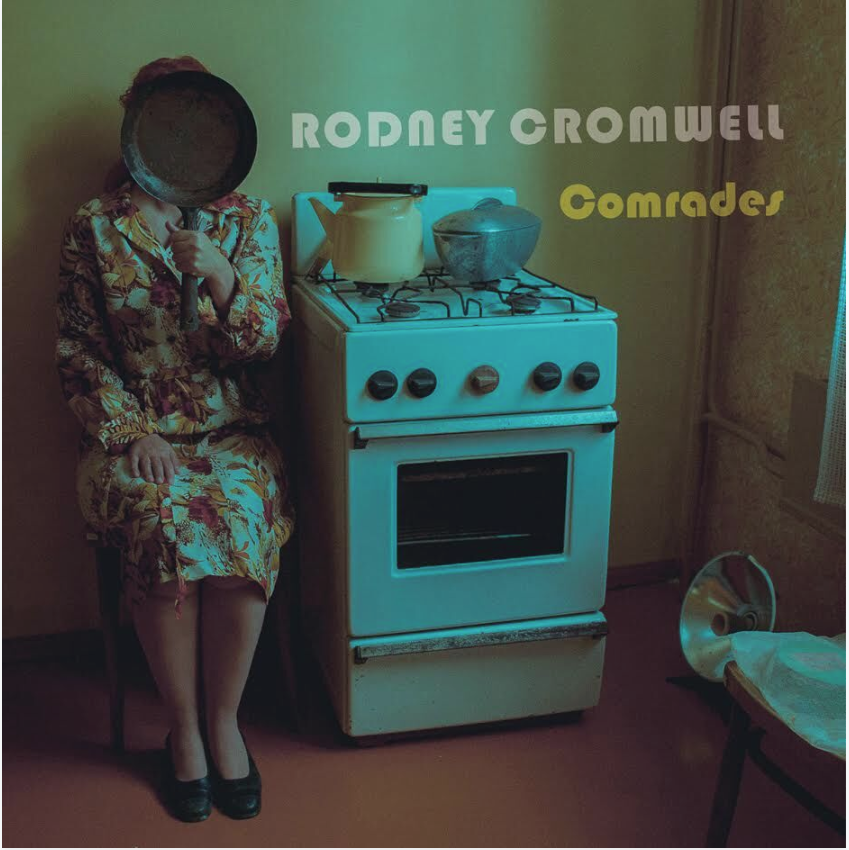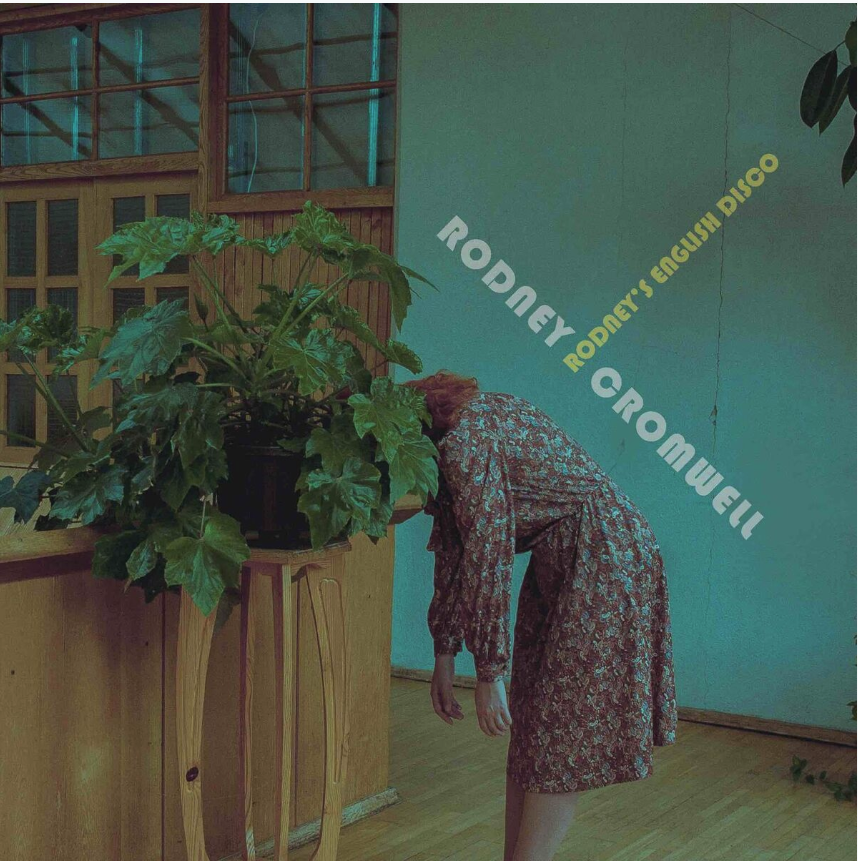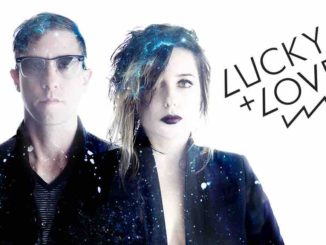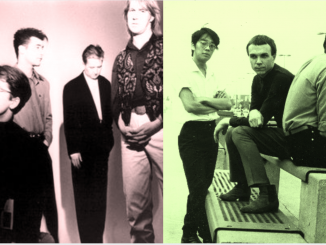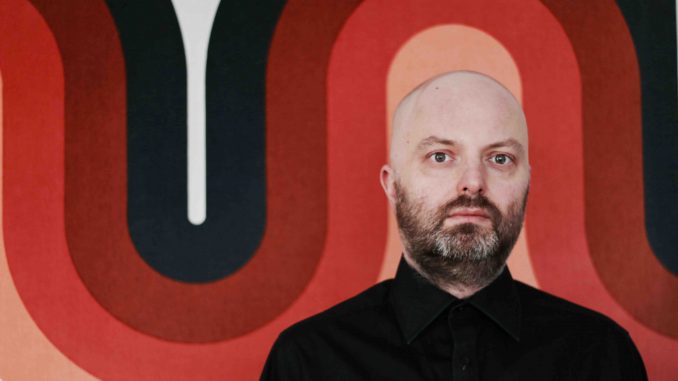
This week we proudly introduce you to London’s electronic modulator, Rodney Cromwell (nom-de-plume of Adam Cresswell), a man with a master-plan, an artist whose notable career starts some 20 years ago as founding member of indie-folktronica band SALOON (which had four entries in John Peel’s Festive 50 & recorded three Peel Sessions) and one half of the acclaimed electronic two piece ARTHUR & MARTHA. Rodney Cromwell has released a string of records via his own boutique independent label, Happy Robots Records, where he carefully curates and publishes material veering from electro-disco to freestyle electronica-wise artists like Hologram Teen (keep that name and I’ll tell you later), Pattern Language, Sinosa, Tiny Magnetic Pets, Arthur and Martha, and more.
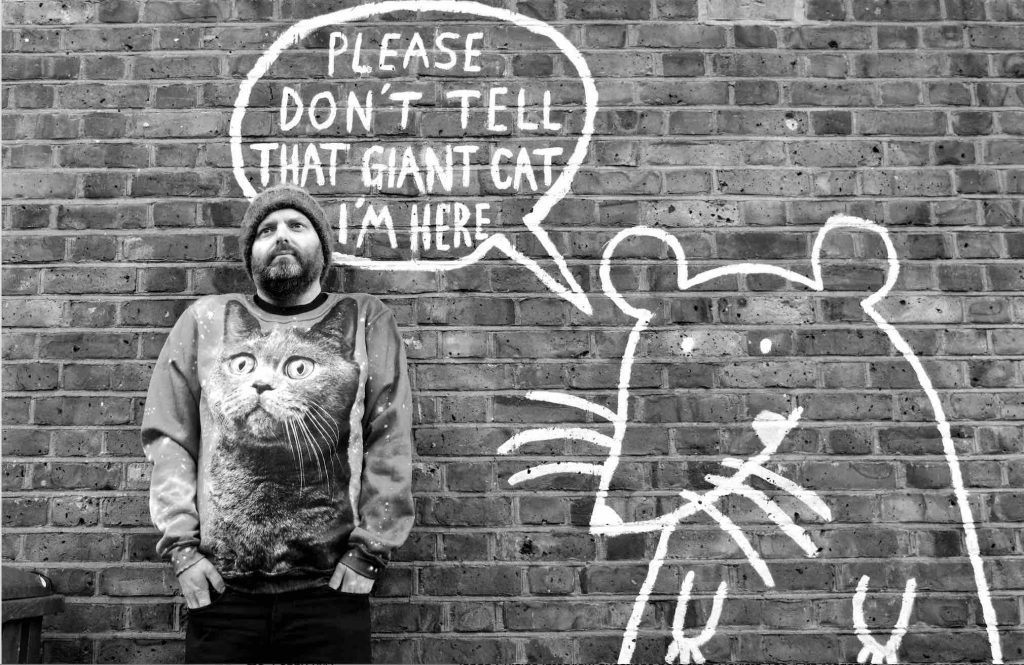
His musical soul belongs to the analog synths forever (and ever) where he finds his pleasures when writing his unique electronica blended with quite a lot of synth-pop, electro and proto-electronica weights and measures, offering monumental groovy strokes to the tribes. From 2015’s widely-noticed Age of Anxiety, we listen to Barry Was An Arms Dealer. One note here: You should always listen to his social-political lyrics…”All I asked was for your love, and you brought me a Kalashnikov.”
A year later he released his Fax Message Breakup EP, a record that was a bit more intense and somehow more astro-pop oriented–from which I’d like you to hear the Single Mix track before we go to one of his most prolific collaborations, in the same record, with Hologram Teen. HT is the moniker of ex-Stereolab’s keyboardist for ages Morgane Llhote, a musician whose styles and likes definitely glued and stick with Rodney’s analog electronica, and as she precisely presents her art: “not just the ex-keyboardist from Stereolab”…and we tune to Fax Message Breakup Hologram Teen’s Video Suitors Remix where the track was twisted toward indietronica, listen!
And here we land in May, 2018 when Rodney’s English Disco LP will be out for the masses to shake and groove to. It’s certainly his most mature and sophisticated work. Of course, along with all grooves and surprises included you’ll experience a record which is heavily worked with some ARP Quartet, Juno 60, Moog Rogue, Korg MS-10, Microkorg and Fender precision bass, and all drum sounds coming from the Boss DR-55. In simple words this means warm, Class A analog paraphernalia that shape a glorious sound, indeed! Comrades, the leading track, preceded the LP in early March accompanied by a remix from synth-wizard Matt Wild’s moniker Vieon. Honestly, both are outstanding, with more electricity and more angular audio processing.
On April 1 the official video came out, directed by Dariy Karyakin and starring Irina Gavrilova and Sofia Lukonina in a retro-wise scenario of futuristic social drama, with, I’ll say that again, outstanding music. Let’s Watch!
And after that, what better than a chat with Rodney Cromwell himself?! So, put on his music and read what he said to us and our readers, enjoy, PPL! [Editor’s note: This interview has been lightly edited for length, style, and clarity]
Hello Mr. Cromwell (Adam), and welcome to Noise Journal. While we await the release of the new “Rodney’s English Disco” EP, you released the lead single “Comrades” on March 2. This also includes Vieon’s Extended Remix. What would you say are the sonic differences in this new release, compared to 2016’s Fax Message Breakup?
Hi Mike. Well, with this new EP I tried to make it sound a little less lo-fi, a little warmer round the edges. So the first decision was to use fewer ancient synthesizers on it – there are still a load of analogue synths on it but not as many as last time. I also used a proper producer in Rich Bennett from NYC who helped give me a much more slick and full sound. We also didn’t master it quite so loud, so it sounds much easier-on-the-ear on platforms like Spotify.
Comrades looks like a manifesto, both the front cover and its official video, which have that retro-stare to past pop-elegancy. Tell us please what led you in this direction and what is the whole movement behind this new development?
The inspiration behind the songs came from the political and social atmosphere of the last couple of years. I found myself becoming increasingly politically active, marching against Brexit, working as a Labour activist as well as (let’s call it) ‘debating’ with people on Twitter. My experiences and the language I was hearing inspired the themes and tone of the record. The sleeve image came from a photographer from Latvia called Jelena Osmolovska. It was the video Director Dariy Karyakin that introduced me to her. I thought her work was wonderful and completely unique, so I plucked up the courage to ask her if I could use an image on my sleeve and amazingly she said yes. I felt her mix of fantasy and soviet architecture, combined with a dark sense of humour, really suited what I was doing with the EP and we went on to use Jelena’s work to inspire the video. It all worked our really well.
I also saw that you are dedicating the single “to the citizens of the future.” That’s a tricky quote, I’d say, and I’d like to ask if you, in general, are forecast an only-analog approach in electronic music in future. Do the lyrics to Comrades have anything to do with this?
The original dedication on the record was “to all the idiots, without whom.” But I felt that was a little cruel, so I decided to make it a little more positive and forward-looking. Comrades isn’t about music at all, the lyrics were inspired by the political demonstrations we have been on and by my wife who is a self-proclaimed anarchist. The title came from hearing Labour party members referring to one another as “Comrades” which seemed like an odd Soviet throwback to me, but sounded good as title.
More and more musicians now insert or heavily use analog synths and paraphernalia in their musings and monikers, from disco-oriented electronics to modern trip hop bands, and all the way to current post-punks. What do you think when you hear a person saying,“Oh come on, digital plugins are capable of perfectly sounding like and simulating analog sound?”
I’ve been using analog for 20 years now – I bought a Moog Rogue when I started my first band 20 [years ago] and I’ve never used digital in a big way, so I’m no expert. But I think digital plugins can do a perfectly good job of simulating analog. When I started doing Rodney Cromwell I was getting played on the radio alongside a lot of synth bands that use just plug-ins, and some of their records sounded way slicker than any of mine. That totally changed my attitude to softs, and I use a couple of plugins on this record.
We understand that your past is checkered with involvement in indie-folk-pop band Saloon and also your duo Arthur & Martha (we assume you were Arthur). How did you transition from those bands into your current run in synthtastic mode?
I think “checkered” is a bit harsh – ha. Well although Saloon was an indie folky band we still used Moogs, so electronics have always been there from the start. Arthur & Martha was a straight synth-pop two piece; in fact, the debut Rod Cromwell album ‘Age of Anxiety’ was conceived as our second album. So I see my musical career as one long continuous journey – there are still people who were into Saloon who are into Rodney Cromwell, and if they’re happy, I’m happy.
What is the link between your music during that period and Stereolab? We see you’ve also collaborated several times now with Stereolab’s long-term synth-muse Morgane Lhote.
Oh Saloon were massively influenced by Stereolab – we totally denied it at the time, but it was glaringly obvious to anyone. There was this great story about how Matt the guitarist from Saloon walked into a club and was like, “Oh wow, they are playing Stereolab.” He rattled his brain trying to work out which Stereolab track it was, until it dawned on him that it wasn’t Stereolab–it was Saloon. Ha ha. Saloon played one gig with Stereolab in 1999 but it wasn’t until Morgie had left them and was doing The Projects that I got to know her when I helped with the production on their debut Let’s Get Static. We hung out a fair bit in London afterwards, watching bad TV and sneaking into movie screenings for free. Then Morgie moved to NYC and then LA, but we kept in touch, probably over MySpace at first. After I put out Age of Anxiety she asked if I’d like to put out her next single on my label. And that became the Hologram Teen Marsangst EP on Happy Robots. Morgane has remixed me since, and we’re talking about doing more stuff. She’s the coolest!
Rodney Cromwell plays synthpop-electro music, which is occasionally spiced with space-disco and minimal-electro elements, and I wonder where else is he going in the future. Please tell us?
Ha – I’ve no idea. I probably won’t be making a trap or a gabba album that’s for sure. I really won’t know what the next record will sound like until I sit down and start messing about with the synths – there is never any plan.
Thank you for your time, Mr. Cromwell. Feel free to mention anything else you’d like!
Thanks Mike. I suppose if anyone has gotten this far they might like to check out my little label, Happy Robots, where you can have a listen to Rodney Cromwell, Hologram Teen and the other great bands that I have put out stuff by. It’s incredibly tough out there for indie labels, so any support is absolutely terrific. And thanks to the Noise Journal for the support, it means a lot.
Keep Up With Rodney Cromwell
and here are the links to Happy Robots Records
Written by Mike D.

